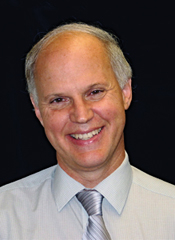
Philip L. Yeagle, a distinguished scholar and educator from the University of Connecticut, has been named dean of the Faculty of Arts and Sciences in Newark (FAS–N), effective August 15, 2007. Jan Ellen Lewis, acting dean of FAS–N since January 2007, will remain at the school as professor and chair of the history department.
Yeagle has been professor and head of the department of molecular and cell biology at the University of Connecticut (UConn) in Storrs, Connecticut, since 1997. At UConn he has had an outstanding record of leadership in a department of more than 50 faculty members, with substantial increases in graduate and undergraduate enrollment, research funding, and endowments, as well as the development of new graduate programs, distance learning, and global educational partnerships.
“Philip Yeagle brings superb leadership experience to this crucial position at Rutgers–Newark,” said Newark Provost Steven J. Diner. “As chair for 10 years of a large and complex department at the University of Connecticut, a leading public research university very much like Rutgers, he has gained broad experience with undergraduate education, graduate study, research, and community engagement. He is a person of high energy and is deeply committed to the idea that the arts and sciences are the foundation of a great university.”
Prior to joining the faculty at UConn, Yeagle was a member of the faculty at the University of Buffalo in Buffalo, New York. At both Buffalo and UConn, Yeagle served as chair and member of numerous university committees, in addition to teaching courses and conducting research in biochemistry. He held visiting professorships at the University of Oxford, England, in 2003 and 1993.
Yeagle is the author of six books and 145 articles in biochemistry published in leading journals. He was executive editor, from 1997 to 2006, of the journal Biochimica et Biophysica Acta Biomembranes. He serves as a member of the editorial board of the Journal of Biological Chemistry.
Yeagle received a doctorate from Duke University in 1974 and a bachelor’s degree from St. Olaf College in 1971, where he graduated magna cum laude with honors in chemistry. Before joining the University of Buffalo faculty he was a postdoctoral fellow at the University of Virginia.
The Faculty of Arts and Sciences at Rutgers–Newark encompasses the Newark College of Arts and Sciences, University College, and the Graduate School–Newark, and traces its history back to the establishment of Dana College in 1930. The Newark College of Arts and Sciences, which enrolls more than 60 percent of the undergraduates at Rutgers–Newark, is the largest of seven schools that constitute Rutgers–Newark, and offers majors in almost 40 fields. Seventeen master’s programs and 15 doctoral programs are offered by the Graduate School–Newark in the arts and humanities, sciences, management, nursing, and criminal justice. University College is designed for adult and nontraditional students to attend class evenings or weekends.